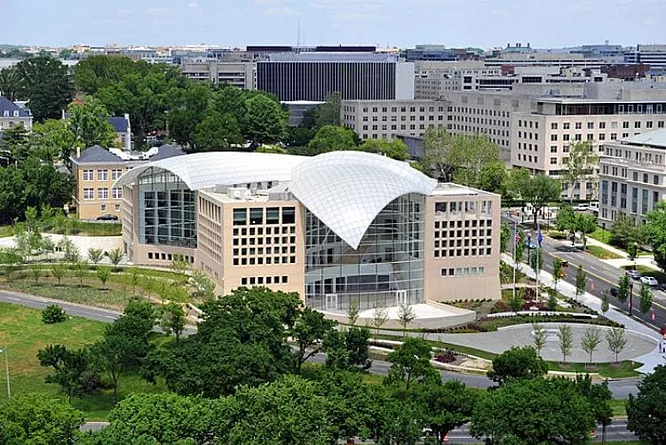The United States Institute of Peace: Pioneering Peacebuilding in a Complex World

In a world rife with conflict and turmoil, the pursuit of peace remains a paramount goal for nations and societies. Established in 1984 by an act of Congress, the United States Institute of Peace (USIP) stands as a beacon of hope and expertise in the field of conflict resolution and peacebuilding. Founded with the mission to prevent, mitigate, and resolve violent conflicts around the world, USIP has played a pivotal role in advancing peacebuilding efforts globally.
Origins and Mission
USIP was established at a time when the world was witnessing numerous conflicts, both within and between nations. Recognizing the need for a dedicated institution to address these challenges, Congress created USIP as an independent, nonpartisan organization tasked with promoting peace and stability through research, education, and on-the-ground engagement.
The institute's mission is rooted in the belief that sustainable peace requires a comprehensive approach that addresses the underlying causes of conflict, fosters dialogue and reconciliation, and builds resilient societies. USIP focuses on advancing knowledge and providing practical tools for conflict analysis, mediation, and peacebuilding, with the ultimate goal of preventing violence and promoting peaceful coexistence.
Core Areas of Work
USIP's work is organized around several core areas, each contributing to its overarching mission:
- Research and Analysis: USIP conducts rigorous research and analysis on various aspects of conflict dynamics, including the root causes of conflicts, drivers of violence, and strategies for peacebuilding. Through publications, reports, and policy briefs, the institute provides valuable insights to policymakers, practitioners, and scholars seeking to understand and address complex conflict challenges.
- Training and Education: USIP offers training programs and educational resources to equip individuals and organizations with the knowledge and skills needed to engage effectively in conflict resolution and peacebuilding efforts. These programs cover a range of topics, including negotiation, mediation, dialogue facilitation, and post-conflict reconstruction, and are designed for diverse audiences, including government officials, civil society leaders, and peace practitioners.
- On-the-Ground Engagement: USIP supports peacebuilding initiatives in conflict-affected regions through direct engagement and partnership with local stakeholders. This includes facilitating dialogue and reconciliation processes, supporting community-led peacebuilding initiatives, and providing technical assistance to peacebuilding organizations and institutions. By working closely with local actors, USIP seeks to empower communities to resolve conflicts peacefully and build sustainable peace from the ground up.
- Policy Advocacy: USIP engages with policymakers, legislators, and other stakeholders to promote policies and strategies that advance peace and conflict resolution. Through policy analysis, advocacy efforts, and congressional outreach, the institute seeks to shape the national and international agenda on peace and security issues, advocating for diplomatic solutions and preventive measures to mitigate conflict risks.
Impact and Achievements
Over the years, USIP has made significant contributions to peacebuilding efforts around the world. From supporting peace negotiations in conflict-affected countries to training thousands of peacebuilders and facilitating dialogue between rival factions, the institute has helped prevent violence, mitigate conflicts, and build pathways to sustainable peace in diverse contexts.
One notable example of USIP's impact is its role in supporting peace processes in countries such as Afghanistan, Iraq, and Colombia. In Afghanistan, USIP has been actively engaged in facilitating dialogue and reconciliation efforts, bringing together diverse stakeholders to explore peaceful solutions to the ongoing conflict. Similarly, in Iraq, USIP has supported reconciliation initiatives and provided technical assistance to strengthen local governance and promote inclusive peacebuilding.
In Colombia, USIP has played a crucial role in supporting the historic peace agreement between the government and the Revolutionary Armed Forces of Colombia (FARC), providing technical expertise, facilitating dialogue, and supporting transitional justice mechanisms. The institute's efforts have helped pave the way for a more inclusive and sustainable peace process in the country.
Challenges and Future Directions
While USIP has made significant strides in advancing peacebuilding efforts, numerous challenges persist in the global landscape of conflict and violence. Emerging threats such as violent extremism, climate change-induced conflicts, and geopolitical tensions present new challenges that require innovative approaches and sustained engagement.
Looking ahead, USIP remains committed to its mission of promoting peace and stability through research, education, and on-the-ground engagement. The institute continues to adapt and evolve its strategies to address evolving conflict dynamics, harnessing new technologies, and partnerships to amplify its impact and reach.
In an increasingly interconnected world facing complex and multifaceted challenges, the work of institutions like USIP remains more vital than ever. By investing in peacebuilding efforts and fostering dialogue and cooperation, we can build a more peaceful and prosperous future for generations to come. As USIP continues to lead the way in pioneering peacebuilding initiatives, its legacy of promoting peace and resolving conflicts will endure, shaping a more peaceful world for all.